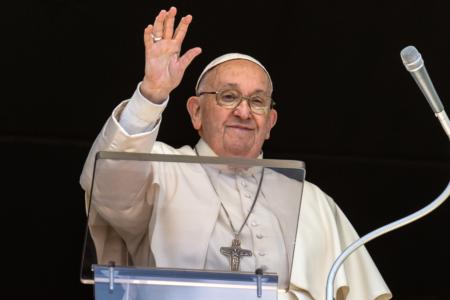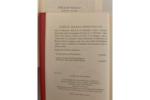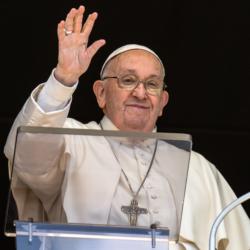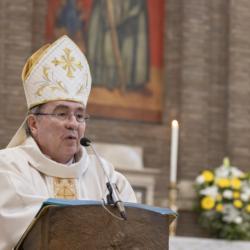Archbishop’s Lenten letter
In most languages the 40 days of Lent are called by a name evocative of the number 40 (careme, cuaresma) to evoke the memory of Jesus’ 40 days of fasting and prayer in the desert at the time of His baptism. In English we call this season a name from Old English that means “springtime.” It is a beautiful way to think of Lent: a time of rebirth, spiritual renewal, new life after the darkness and cold of winter.
Lent is our baptismal retreat. On the first Sunday of Lent the parish communities send their adult candidates for baptism and reception into the Church to the Cathedral of the Holy Cross for the Rite of Election. It is encouraging to see these new Catholics choose to come into the Church even in these times of crisis. Their searching and prayer have led them to seek a spiritual home in our faith community. We must be a welcoming community reaching out to the new Catholics with a spirit of love and solidarity. This Lent is the final preparation for their coming into the Church at the Easter Vigil on Holy Saturday evening. We accompany them by making Lent a baptismal retreat ourselves. I would also urge our Catholics to attend the Easter Vigil. It is the most important liturgy of the Church year. Blessed Carlos (Charlie) Rodriguez, a Puerto Rican lay apostle beatified by Pope John Paul II, used to say of the Easter Vigil: “We live for this night.”
The blessing of the fire and the Paschal Candle which will burn at our baptisms and funerals and the blessing of the Easter water are powerful symbols of our Easter faith in the risen Christ. Our presence at the Easter Vigil also unites us spiritually with the many thousands of men and women who will be baptized and received into the Catholic Church at the Vigil celebration. It is a splendid culmination of our Lenten retreat.
Lent is often billed as “a time to give things up”; and we “health conscious” Americans translate the discipline of Lent into “healthier life styles” by swearing off cigarettes, alcohol, sweets. This is all well and good, but it is not enough. Lent needs to be a time of spiritual renewal, a time to take stock of our lives and recommit ourselves to living our baptismal call to discipleship and holiness.
We need to make time and space for God in our lives. Lent needs to be a time of more prayer and reflection. The daily Mass, the rosary, Stations of the Cross, scripture reading and parish missions are important ways of living our Lenten retreat.
Lenten prayer takes on a special meaning when united with fasting and almsgiving. Depriving ourselves of some creature comfort to express sorrow for our sins and solidarity with the poor and suffering is an important part of Lent. Hopefully our Lenten sacrifices will allow us to use that money that would have been spent on luxuries or entertainment to help the hungry and the poor of the world. The Rice Bowl Program of Catholic Relief Services is a wonderful way to help the poorest of the poor.
Lent is also a time when Catholics try to receive the Sacrament of Reconciliation as part of the spiritual journey of this season of conversion. It is a time for letting go and forgiving. It is a time for asking pardon and making new beginnings in our relationships with God, with members of our families, with our neighbors. It is only by examining our life in the light of the Gospel that we discover how much God loves us and how great is His mercy.
As we begin this Lenten retreat, the rite of the Ashes reminds us of our mortality and of the need to use well the time that God has given us. We are pilgrims who come from God and we return to Him. We do not travel this way alone. Our brothers and sisters in the household of faith as well as the saints who went before us are our companions on the journey.
Be assured that each day I will lift you up in prayer even as I trust that you will continue to pray for me, your brother and your shepherd.
In Jesus Crucified and Risen,
Archbishop Seán P. O’Malley, OFM Cap.


















